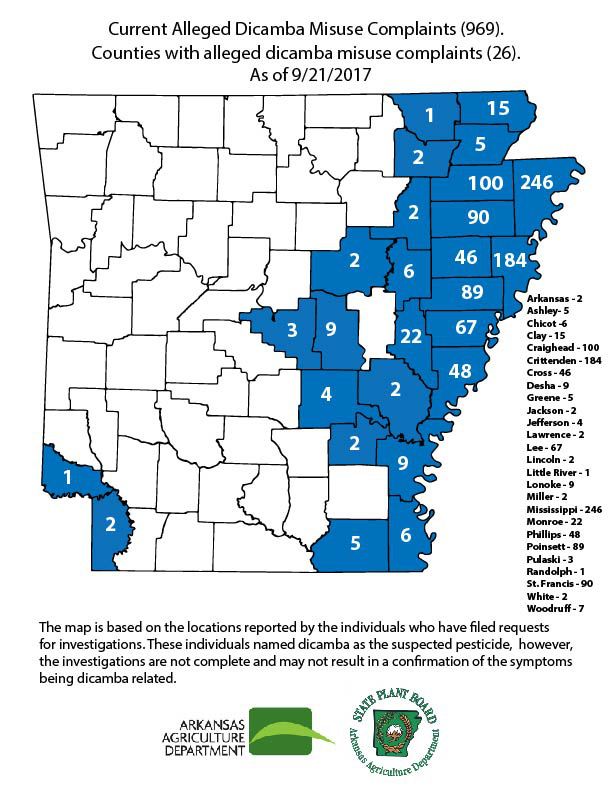

The Arkansas Plant Board has
approved new regulations that prohibit the use of dicamba from April 16 through Oct. 31, 2018 after receiving nearly 1,000 complaints of pesticide misuse in the state.
Arkansas, which temporarily banned the highly volatile weedkiller in July, could now face legal action from Monsanto, the developers of dicamba-resistant soybeans or cotton and the corresponding pesticide, aka the Xtend crop system.
Reuters reports:
“Monsanto previously submitted a petition asking the board to reject the proposed cutoff date for sprayings and warned the company may file a lawsuit if the board denied the request. If implemented, the deadline could hurt sales of dicamba herbicides and Monsanto seeds resistant to the chemical.
The board unanimously denied Monsanto’s petition and will work with legal staff to prepare a response, according to a statement.
Monsanto developed its Xtend system to address “superweeds” that have grown resistant to glyphosate, the main ingredient in the company’s former bread-and-butter, Roundup. It’s not surprising that the company might file suit against Arkansas—Xtend crops are expected to expand across 80 million acres in the U.S., creating a $400-$800 million opportunity.
What’s happening in Arkansas is just a small slice of what’s happening across the country’s farm belt. Complaints of dicamba damage have surfaced in 24 states, impacting roughly 3 million acres.
“We are in unprecedented, uncharted territory,” Andrew Thostenson, a pesticide program specialist with North Dakota State University Extension, told
DTN. “We’ve never observed anything on this scale in this country since we’ve been using pesticides in the modern era.”

The controversy surrounding dicamba
started last year when Monsanto decided to sell its Xtend cotton and soybean seeds several growing seasons before getting federal approval for the corresponding herbicide. Without having the proper herbicide, cotton and soybean growers were suspected of illegally spraying older versions of dicamba onto their crops and inadvertently damaging nearby non-target crops due to drift. Off-target crops are often left cupped and distorted when exposed to the chemical.
Monsanto, DuPont and BASF SE, now sell federally approved dicamba formulations that are supposedly less drift-prone and volatile than older versions when used correctly.
“New technologies take some time to learn,” Scott Partridge, Monsanto’s vice president for global strategy, told the
New York Times. “Thus far, what we’ve seen in the field, the vast majority, more than three-quarters of them, has been due to not following the label.”
But problems with dicamba remain. Farmers their Catch-22 situation to the Times:
Some farmers say they face a difficult choice—either buy the new genetically modified seeds or run the risk that their soybeans would be damaged more by a neighbor’s spraying of weed killers than by the weeds themselves.
“If you don’t buy Xtend, you’re going to be hurt,” said Michael Kemp, a Missouri farmer, referring to the brand name of Monsanto’s seeds.
Even the Environmental Protection Agency (EPA) is mulling limits on the dicamba next year and is consulting with state officials and experts, including ones in Arkansas.
“[EPA] is very concerned with what has occurred and transpired in 2017, and we’re committed to taking appropriate action for the 2018 growing season with an eye towards ensuring that [dicamba] technology is available…for growers, but that it is used responsibly,” said Reuben Baris, who works at the EPA’s Office of Pesticide Program.
The Arkansas plant board’s regulatory changes will now be subject to a 30-day public comment period followed by a public hearing on November 8. The proposed rule will then be forwarded to the Executive Subcommittee of the Arkansas Legislative Council for final approval.
Public hearing for proposed dicamba regulations prohibiting use in AR from April 16 – Oct 31 scheduled for Nov 8: https://t.co/brLNPVJEWm pic.twitter.com/imoxd4TdWB
— Arkansas Department of Agriculture (@ARDeptofAgricul) September 21, 2017

 233k
233k  41k
41k  Subscribe
Subscribe 